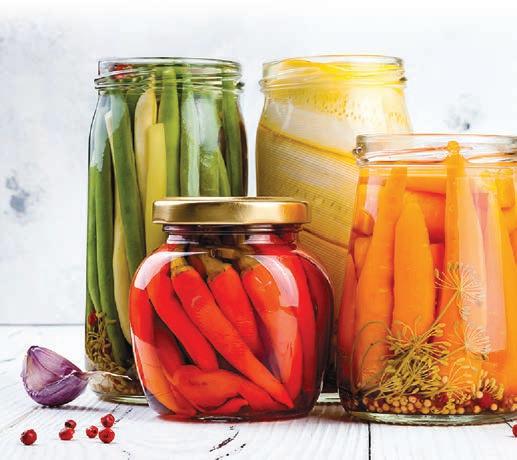Trusting Her Gut
Suzette Smith is the founder of Garden Goddess Ferments. (Photos by Chris Mortenson)
Entrepreneur trades supplements for fermented foods BY CONNOR DZIAWURA Suzette Smith leads the way through her small office and pushes apart the vinyl strips hanging from the door frame into the next room. The building, which she recalls was previously a yarn distributor for eBay, now operates as a commercial kitchen. It is here where Smith, the “Garden Goddess,” prepares her products: fermented foods. Despite being just five years in—only half of the time in this kitchen—Garden Goddess Ferments has quickly grown in reputation, upgrading from 40-liter fermenting crock pots to 500-liter ones along the way. Tucked snugly behind Rainbow Donuts, off McDowell Road and between 13th and 14th streets, Smith claims to run the Valley’s sole fermentation kitchen. Beet kvass and sauerkraut of various flavors comprise the bulk of what Smith prepares in these crocks. According to Smith, the Central Phoenix structure is a “raw kitchen,” so you won’t find proteins or fats, and no heat sources are used. She just “let(s) nature do its thing.” While fermented foods are not new, Smith feels many people are not familiar with the product. Many fermented foods are said to contain probiotics or the bacteria helping to regulate gut health. Because of poor dietary trends—she calls the standard American diet “sad”— Smith initially turned to supplement sales, but she realized “you can’t supplement your way out of a bad diet.” “What they’re finding is fermented foods, like a jar of homemade sauerkraut, have hundreds and hundreds of strains of bacteria—unique strains, some strains can only be found in fermented foods, and cannot be replicated in a probiotic pill. Your probiotic pills tend to carry up to 10 to 15 strains of bacteria. You don’t know how they’re processed, if they’re fed right, how they’re conditioned,” Smith says. “So, we’re finding more and more fermented foods are a far superior source of probiotics than a pill source, and it’s just because you get different bacteria from the vegetable itself—from the soil.” These probiotics are said to have many positive health impacts. According to a pamphlet, for example, Smith’s beet
12
|
FEBRUARY 2020
kvass—a fermented, vegan-friendly beet tonic—oxygenates and alkalizes the blood, promotes regularity, aids digestion, cleanses the liver, removes toxins, combats chronic fatigue, kills sugar cravings and more. Smith has even found herself crying tears of joy because customers have opened up about “intimate and personal body functions” they say Garden Goddess’ products have improved. “Ultimately, we want people to understand food is medicine and fermented foods are so cool,” Smith says. “I’ve got a microbiologist now working with me studying our bacteria under the microscope. “I’m a very passionate person, so being in the supplement industry and the food industry, (I’ve found) Americans are very misled by what they’re eating. And it just infuriates me. I mean, you’ve got sauerkrauts on the shelf that say they’re raw— like, fermented—but if you go into their website a couple of layers, they’re lightly pasteurized, so people aren’t getting the nutrients they think they are.” The businesswoman—who years back launched a kids’ swimwear line and then ran a home staging business, before struggling to make money in supplement sales—was first led down the fermented food’s pathway by an article she read online. When she tried her hand at making some at home and her friends loved the
taste, she decided to take it a step further. “I had a decision to make: Do I maybe see what this is like and go start a food business or keep banging my head selling supplements?” she admits. It’s proven an arduous journey. From finding synergy with the health department to losing plenty of money over the years, she has come far. And while there can still be obstacles, like educating unfamiliar consumers and getting products on store shelves, Smith has nevertheless built a brand for herself. “I thought, ‘This is so big. This is so much,’” she recalls of the accomplishment she felt after her first order, which required 80 pounds of cabbage. She says she now works with almost 700 pounds. Consumers can now find the beet kvass
on shelves at Whole Foods or listed on Amazon, while AJ’s Fine Foods stocks the beet kvass and the sauerkraut. Consumers looking to buy directly from the “garden” can hit up Garden Goddess online or find the company at local farmers markets. Products are available in various sizes and flavors, and subscriptions and packages are offered. While Smith would eventually like to open a “food apothecary” at her kitchen, she also wants to take the beet kvass to a national level. And although her focus is beet kvass and sauerkraut, she says she has in the past sold fermented “Better Beets” (jarred beets) as well as garlic. She would like to bring both back, as well as sell apple cider vinegar and honey. “We’ve got two other little, small businesses in here that share space with us, but for the most part we’re in here and we’re just ready to explode,” Smith says. She is often asked by people how they should consume her products, and she emphasizes all it takes a shot of the kvass a day. A little bit of kraut goes a long way, too, and can be added to dishes or eaten by itself. But aside from not cooking or heating fermented foods, she suggests not overthinking it. “Don’t make it complicated,” she says. “Just eat it.” For more information on fermented foods and probiotics, ingredients, benefits and servings, visit gardengoddessferments.com. www.LovinLife.com
















